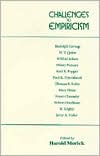

 |

|

The average rating for Challenges to Empiricism based on 2 reviews is 4 stars.
Review # 1 was written on 2018-09-06 00:00:00 Debby Weinberger Debby WeinbergerSeeing the title and having been on an unchallenged empiricism bend for awhile, I picked this out of a pile, and I'm glad I did. Most of the articles could probably be found elsewhere by now, but this collection is stellar. (Someone familiar with the field who looks at the list will probably not be surprised by this.) Though I cannot say I'm entirely dissuaded from empiricism, this book definitely complicated the matter for me. The book divides into three sections, and I got something a bit different out of each one. The first coves ontology and seems to have what one might call the "classic" articles on empiricism from 20th century analytic philosophy. Carnap's "Empiricism, Semantics, and Ontology" complicates empiricism off the bat. Prior to reading Carnap I was rather convinced of ontological idealism, but with the translation work between ontological theories, it's less clear that there's even a debate there. The other articles in the section continue by poking interesting questions at what power empiricism can and should have to inform or deflate ontological questions. The next section on science had the big takeaway, for me at least, that great conjectures start as unempirical claims. Or, to paraphrase Feyerabend, they start as metaphysics and are refined into concrete science. The final section on linguistics covered a hole in my understanding of philosophy of mind. I learned that behaviorism fell when Chomsky showed that language is too complex for behaviorism to explain. Goodman and Quine give behaviorism some good tools in its defense, but Fodor gives a quite concrete example of a limit to behaviorism as a methodology. By the end, any prima facie belief in anything like an easy observational language should be well-shaken. There's no attempts to completely annihilate empiricism, but (once-)popular aspects of it prove to be quite costly. |
Review # 2 was written on 2014-03-19 00:00:00 Edwin M Ortez Edwin M OrtezMele covers some interesting topics, particularly the issue of luck with regard to agent-causal theories. If an agent has the ability to do otherwise, even given an identical past and laws of nature, it seems that the decision the agent makes must be arbitrary. There is no possible differentiating factor that can account for the differences. Mele also devotes a chapter to the Libet experiments. These show a readiness potential in the individual's unconscious prior to the actual performance of the action. Neuroscientists and philosophers have concluded from this that free will is an illusion--our decisions are pre-set for us. Another important distinction is that of "robust" alternatives. Compatibilists can weave in alternatives, but they are not robust, because determinism means they will never be realized. |
CAN'T FIND WHAT YOU'RE LOOKING FOR? CLICK HERE!!!